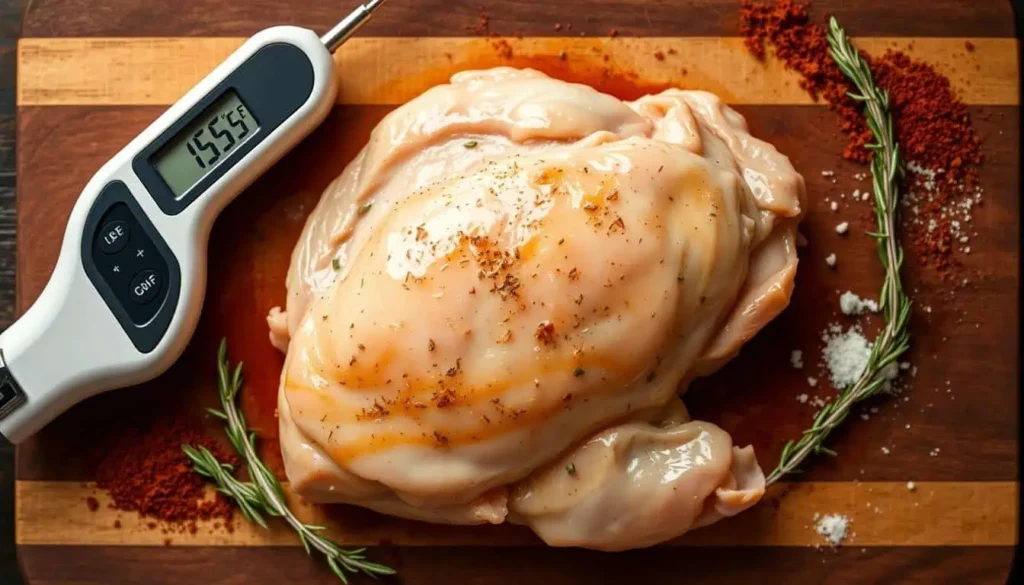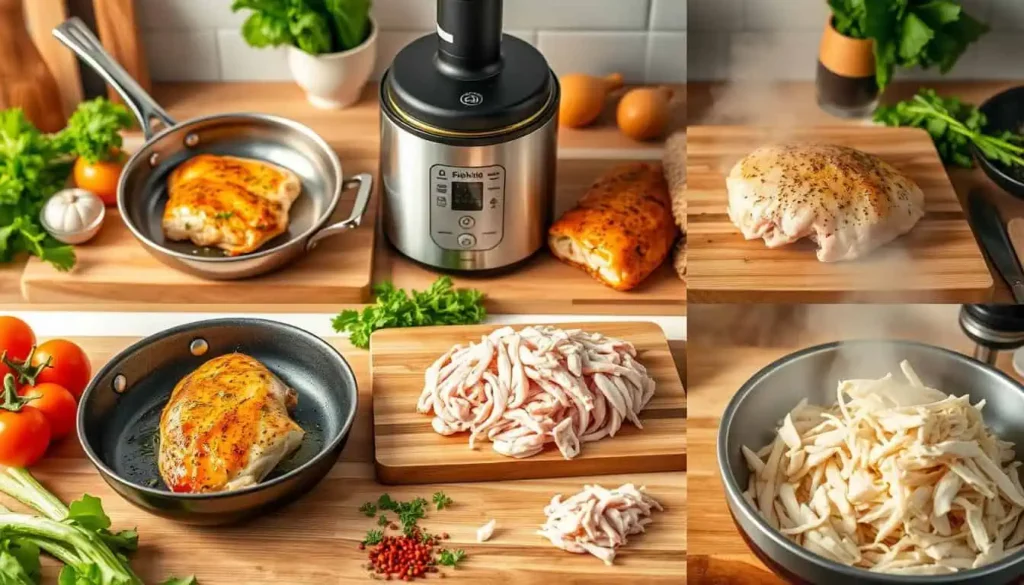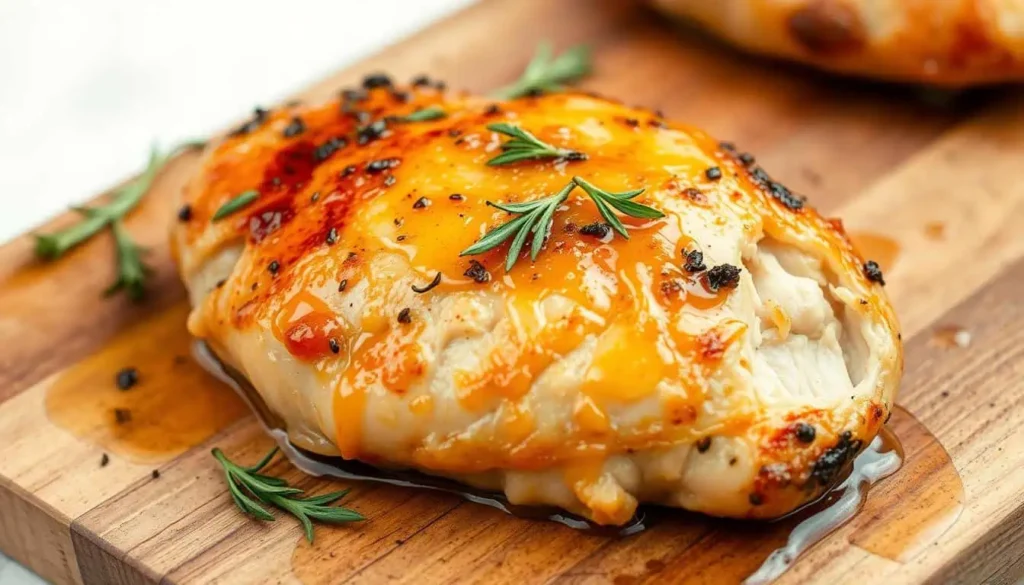What is the secret to moist chicken breast? To achieve the juiciest chicken breast, you need to focus on both cooking and preparation techniques. I’ve experimented with various methods to find the perfect balance of taste and moisture. Each cooking method impacts the final texture differently, so choosing the right approach is key to achieving delicious results.
Key Takeaways
- Moist chicken breast relies on proper cooking temperatures.Resting time significantly enhances juiciness.Choosing the right cooking method is crucial.Brining or marinating chicken adds flavor and tenderness. Learn more about seasoning techniques like Gordon Ramsay’s methods.Using a meat thermometer helps achieve perfect doneness.
Understanding the Science Behind Moist Chicken Breast
To get juicy chicken breast, you need to know the cooking science. Two key things matter: the cooking temperature and the resting time. These factors greatly affect whether your chicken is juicy or dry.
The Role of Cooking Temperature
The best cooking temperature for chicken breast is between 165°F and 185°F. This range kills harmful bacteria and keeps the chicken juicy. The secret to moist chicken breast lies in maintaining this optimal temperature—cooking too hot can dry out the meat, so it’s important to check the internal temperature.
A good meat thermometer helps you cook it just right. This way, you get a moist and flavorful chicken.
How Resting Time Affects Juiciness
Letting the chicken rest after cooking is crucial. When it sits for a few minutes, it absorbs its juices again. This makes the chicken tender and flavorful.
This simple step can make a big difference in enjoying perfectly cooked chicken.

What is the secret to moist chicken breast?
To get the juiciest chicken breast, you need to think about how you cook and prepare it. The secret to moist chicken breast lies in finding the perfect balance of technique and temperature. I’ve tried many ways to find the perfect mix of taste and moisture. Each cooking method has its own way of affecting the chicken’s final texture, so picking the right one is key.
Choosing the Right Cooking Method
Each cooking method for chicken can change how moist it stays. Grilling, roasting, and poaching all make tasty chicken but in different ways. For example, grilling gives a nice char but can dry out the chicken if cooked too long. On the other hand, poaching cooks in liquid, keeping the chicken moist and tender. Try a balsamic chicken recipe for more inspiration. Knowing these differences helps me pick the best method for the dish I want.
Importance of Brining or Marinating
Before cooking, I often focus on brining or marinating the chicken. Brining soaks the chicken in saltwater, adding flavor and keeping it moist. Marinating in spices and acids breaks down proteins, making the chicken juicy. Discover what balsamic vinegar can do to elevate your sauces and marinades.
The secret to moist chicken breast lies in these preparation techniques. Both brining and marinating are crucial for locking in moisture, ensuring each bite is flavorful and juicy. Choosing the right method can make a big difference in the taste and enjoyment of moist chicken breast.

Both brining and marinating are crucial for moist chicken. They add flavor and keep each bite juicy. Choosing the right method can make a big difference in taste and enjoyment of moist chicken breast.
| Cooking Method | Description | Moisture Retention |
|---|---|---|
| Grilling | Cooking on a grill for a smoky flavor | Moderate, watch for dryness |
| Poaching | Cooking in simmering liquid | High, very tender |
| Oven Roasting | Cooking in a preheated oven | Good, but watch the time |
| Sous Vide | Cooking in a water bath at a precise temperature | Very high, perfect control |
Techniques for Cooking Chicken Breast Properly
Cooking chicken breast right needs focus and the right methods. I’ve learned that using specific techniques makes a big difference. The secret to moist chicken breast is all about precision—here are my top ways to get delicious, juicy chicken every time. I focus on using a meat thermometer, cooking in a skillet, baking in the oven, and keeping moisture in.
Using a Meat Thermometer for Perfectly Cooked Chicken
Getting a good meat thermometer was a smart move for my kitchen. It’s key to know the perfect internal temperature for chicken. I aim for 165°F to avoid overcooking and dry meat. With a meat thermometer, I can serve juicy chicken every time.
Skillet vs. Oven: Which is Best?
Choosing between skillet chicken and oven-baked chicken depends on what I’m making and how much time I have. The secret to moist chicken breast lies in choosing the right cooking method for the best texture and flavor. Skillet cooking gives a quick sear that keeps moisture in, while oven-baked chicken cooks evenly without needing constant attention. I like trying both to see how they change the taste and texture.
Sealing in Moisture with Foil or Broth
Wrapping chicken in foil or cooking it in broth boosts moisture. This method traps steam, making the chicken tender and juicy. Learn how leftover chicken recipes can benefit from these techniques.
Storing Leftover Chicken to Maintain Moisture
Keeping leftover chicken juicy can be tricky. Whether it’s from a great takeout or home-cooked, following best practices helps. This section explores how to keep chicken moist and flavorful.
Best Practices for Storing Rotisserie Chicken
To enjoy my rotisserie chicken, I always do the following:
- Remove excess skin and fat to avoid sogginess.
- Store chicken in an airtight container to keep moisture in.
- Keep it in the fridge for up to four days to stay fresh.
Freezing Rotisserie Chicken: What You Need to Know
Freezing leftover chicken is a smart move if there’s too much. Follow these steps to freeze chicken like a pro.
Here are my top tips:
- Wrap chicken in plastic wrap before freezing to prevent freezer burn.
- Remove air from the bag for better preservation.
- Label the bag with the date for up to three months of quality.
How to Reheat Leftover Chicken Without Drying it Out
Knowing how to reheat chicken is crucial for enjoying it again. Here are my favorite reheating chicken tips:
- Use a microwave on medium power, covering with a damp paper towel.
- Reheat in a skillet with a bit of broth for juiciness.
- A hot oven with a splash of water in a covered dish works well too.
Conclusion
Reflecting on the journey to juicy chicken, I’m excited to share key moisture techniques. Understanding cooking temperatures is key; it ensures chicken is juicy. Resting time and methods like brining or marinating also play a big role.
Exploring cooking techniques showed me the value of a meat thermometer. Different cooking methods, like using a skillet or oven, affect the dish. Adding moisture with foil or broth enhances texture and flavor.
In closing, I hope these tips inspire you to cook moist chicken breast. With these insights, experiment in the kitchen. Enjoy the delicious results of mastering juicy chicken. Happy cooking!
FAQ
Can you freeze rotisserie chicken to use later?
Yes, you can freeze rotisserie chicken for later use. Freezing helps keep its flavor and texture fresh for future meals.
What is the best way to freeze rotisserie chicken?
To freeze rotisserie chicken well, cool it first. Then, remove the meat from the bones. Store it in airtight containers or freezer bags. Make sure to remove as much air as you can before sealing to avoid freezer burn.
How should I store leftover rotisserie chicken in the freezer?
Store leftover rotisserie chicken in an airtight container or freezer-safe bag. It’s smart to portion it out into smaller servings for easier reheating later.
What are some tips for freezing leftover rotisserie chicken?
Cool leftover rotisserie chicken completely before packaging. Label containers with the date for easy tracking. Freeze it within two hours of cooking to keep its quality.
How do I reheat frozen rotisserie chicken without drying it out?
To reheat frozen rotisserie chicken without drying it out, bake it in the oven covered with foil or microwave it on a lower power setting. Adding a bit of broth can also help keep it moist.
Can I freeze rotisserie chicken with its skin on?
Yes, you can freeze rotisserie chicken with its skin on. The skin helps keep moisture in during freezing and reheating. But, if you want a leaner option, you can remove it before freezing.
What is the recommended storage time for freezing cooked chicken?
Cooked chicken can be frozen for up to 3-4 months for the best quality. After that, it’s still safe to eat, but the taste and texture may not be as good.
Is it safe to freeze chicken that has been left out?
It’s not safe to freeze chicken that’s been left out at room temperature for more than two hours. Always refrigerate or freeze leftovers quickly to ensure safety.


1 thought on “What is the secret to moist chicken breast?”
Comments are closed.